|
Economists love to say that there’s no such thing as a free lunch – meaning that someone, somewhere is always footing the bill, even if it’s not you. This conundrum is driving a lively debate in cities like Boston and Washington, where advocates want to make public transit, or at least select services, free.
In their view this is a good way to boost ridership and promote equity, since low-income households rely more on public transit than the affluent do. But urban policy scholar Nicholas Dagen Bloom, author of a recent history of public transit in the U.S., argues that taxpayers and politicians aren’t likely to provide the big subsidies that free transit requires. In Bloom’s view, a better strategy is to offer fare discounts for low-income families, students and other target groups, and attract riders with frequent, high-quality service.
Also today:
|

Chicago’s Washington-Wabash station opened in 2017 – the first new stop on the city’s elevated rail system in 20 years.
Youngrae Kim/The Washington Post via Getty Images
Nicholas Dagen Bloom, Hunter College
Everyone likes getting something for nothing, but history shows why the math behind free public transit doesn’t add up.
|
Ethics + Religion
|
-
Nicholas G. Evans, UMass Lowell
Effective altruism, often called ‘EA,’ is closely linked to utilitarian philosophy and calls for donors to carefully scrutinize whether their giving makes an impact.
|
|
Science + Technology
|
-
Laura M. MacLatchy, University of Michigan; Dan Peppe, Baylor University; Kieran McNulty, University of Minnesota
Contrary to the idea that apes evolved their upright posture to reach for fruit in the forest canopy, the earliest known ape with this stature, Morotopithecus, lived in more open grassy environments.
|
|
Economy + Business
|
-
Thomas Godwin, Purdue University
The federal government wanted to give taxpayers a couple months to prepare the year’s taxes. But as filing became more complex, the date was pushed back.
-
Zachary Morris, Stony Brook University (The State University of New York)
More than half of working-age adults over 50 with a work-limiting disability didn’t receive any benefits from Social Security in 2016.
|
|
Education
|
-
Anna Rhodes, Rice University; Julia Szabo, Rice University
Parents who had positive experiences in school often select schools for their children that are similar to the ones they attended – but if they had a bad experience they avoid those kinds of schools.
|
|
Podcast 🎙️
|
-
Nehal El-Hadi, The Conversation; Daniel Merino, The Conversation
Because of its historical social and economic significance, conservation of sandalwood should consider cultural diversity.
|
|